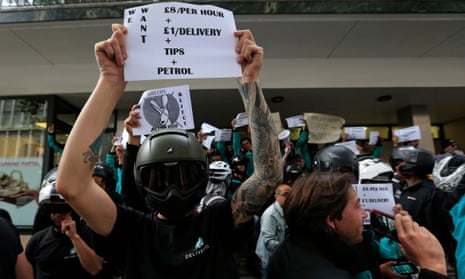Deliveroo has been told by the government that it must pay its workers the minimum wage unless a court rules that they are self-employed. The food delivery company, which is embroiled in a pay row with its couriers, has had its proposed wage deal described by the Labour party as “Victorian”. The plans prompted hundreds of self-employed riders to protest over attempts to pay them per delivery rather than by the hour, a move which, they say, will significantly reduce their earnings.
The Department for Business, Energy and Industrial Strategy insisted that workers must be paid the “national living wage” (NLW) of £7.20 an hour unless a court or HM Revenue and Customs defines them as self-employed. “The government is determined to build an economy that works for all – that includes ensuring everyone gets a decent wage. An individual’s employment status is determined by the reality of the working relationship and not the type of contract they have signed,” a BEIS spokesman said.
“Individuals cannot opt out of the rights they are owed, nor can an employer decide not to afford individuals those rights. Employers cannot simply opt out of the NLW by defining their staff as self-employed.”
Deliveroo delivers food from thousands of restaurants that do not have their own delivery service. Its clients include Pizza Express, Byron and Gourmet Burger Kitchen. The company charges customers £2.50 per delivery.
Couriers, who are self-employed and provide their own transport, said the move to £3.75 per delivery, instead of an hourly rate of £7, plus £1 per delivery, would lead to uncertainty and lower wages. They are keeping up their protests and the next strike will be in Camden, north London, later on Sunday.

On Friday, the company was criticised by the shadow business secretary, Jon Trickett, who accused Deliveroo of “offering a return to a Victorian system which has no place in modern Britain”.
Speaking to the Guardian on Thursday, Amir Ali, a Deliveroo courier who went on strike last week, said: “£7 an hour was OK, and if you worked hard, it was good. But now they are cutting it below the basic wage. We work in snow, we work in rain. They don’t give you a place to sit down.”
Deliveroo has insisted that the new pay deal is only being trialled in certain areas of London, with about 280 riders taking part, out of more than 3,000 in the capital. In a blogpost, it said pilots of the pay-per-delivery system have led to a doubling of average hourly fees for riders during the busiest times.
Dan Warne, Deliveroo’s UK managing director, said: “We’re committed to having an open conversation with riders about this trial. We’ve reached out to every rider involved to gather feedback. We’ve listened to their concerns and offered every rider the choice to withdraw from the trial.
“For those that choose to take part in the trial, we’ll also be guaranteeing [that] fees at peak times for riders will be at least £7.50 per hour, plus tips and petrol costs.”
The company added that under the old pay model, its couriers earned an average of around £9 an hour, while it claimed the new scheme would result in payments of “about £10 per hour, with efficient riders making £15-£17 and some as much as £25”.
The criticisms of Deliveroo come after the Guardian revealed last month that Hermes, Britain’s second-biggest parcel company, is paying some of its couriers at levels equivalent to below the national living wage because they are self-employed.
Hermes said it is “committed to ensuring that our couriers receive earnings that are equivalent or higher than the national living wage” of £7.20 per hour.
